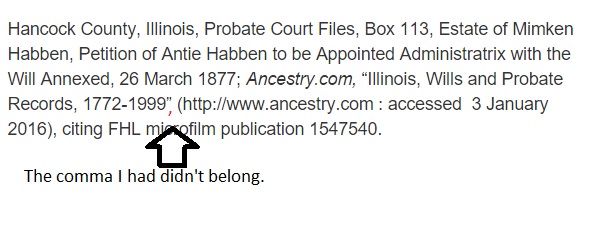In “Sourcing Probate Materials From Ancestry.com,” I asked for comments on the citation I constructed. A correspondent very graciously contacted me to ask if there had been a change in the rule about commas not being used before parenthesis. Before anyone overreacts to my being contacted by someone over an extra comma, be reminded of the following:
- I asked for comments in my original posting. My exact words were: “I’m open to suggestions.” “Open to suggestions” means that I am open to suggestions and invites such suggestions.
- I wanted the citation to be correct. While I have no problem being wrong, I certainly do not relish being incorrect nor do I intentionally post erroneous items. It is duly noted that corrections to blog posts do make excellent blog posts themselves.
- This person knows me relatively well and probably knew that I was not going to overreact like a frothing rabid dog simply because I was asked about an extra comma.
- See 1 one more time.
Does the average genealogist really need to worry about the comma? I’m going to go out on a limb here and say “no.” They don’t. The comma did not change the fact that I had the essential information in my citation. That is what matters. I included the details of exactly how I located the material I used:
- the original creator
- the location within the original creator’s files
- the title and date of the document
- the publisher
- the title
- where the publisher got their image to publish since it wasn’t directly from the original creator
For most of us, the comma does not really matter. It will not be the end of the world if your citations are not in editorially correct form. The goal of citation is to largely to improve the researcher’s analysis of information that has been obtained. If a citation has all the essentials, that will work for the vast majority of situations and, most of the time, a genealogist will figure out what is meant. If you must spend time “cleaning up a citation” do so making certain the six bulleted items mentioned earlier are crystal clear instead of pulling your hair out over a comma. There is a reason for commas, semicolons, and the like. Punctuation serves to clarify and to give a structure to citations in order to reduce confusion on the part of the reader.
I want to be clear. I’m not suggesting such an obsession with bibliographic perfection that your genealogical research brings back horrific memories from high school English. If you ever decide to submit for publication in a genealogical journal that requires correctly formatted citations, then you can worry about all the nitty gritty then. In the meantime:
- don’t fear the comma,
- don’t fear the parenthesis, and
- don’t fear the semicolon.
There is one thing you should fear. Fear making incorrect conclusions because you didn’t give any thought to citing anything. Remember that all of us (myself included) have uncited information from our early days of research. That doesn’t mean we need to keep researching in that fashion. It doesn’t mean we are “bad genealogists” because we have uncited statements in our files. It means we started out our research just like everyone else.
Methodology matters. Just this week, I found pretty solid information proving that my relative’s baby born a few years before her marriage was not the child of the man she later married. The information was sitting right there in the probate file. All that had to be done was to read the records and contemplate just a little. The analysis was not difficult.
And no commas were involved.
Note: When citations are used in this blog they are created in the spirit of Evidence Explained. Our goal is not to reproduce that book as:
- I don’t create “proper” citations for every document I use. However, if the blog post is read there is enough detail available for the creation of a citation and the determination of where the information was located.
- I focus only on locations and ethnic groups in which my children have a “genealogical interest” and there are quite a few regions that does not cover.
Our goal is to try and make readers better researchers, get them thinking, and occasionally to entertain.


4 Responses
We are not perfect, and not everyone can know every single grammar rule. Even among the people who do watch all of this, they can also disagree. Continue to do the best you can.
I continue to learn from your posts. I thank you for them.
Thanks, Karen.
You are exactly right that there can be disagreement. Even when there is, the disagreement is often about a formatting question or a grammatical “nicety.” As long as the essential information is there, that’s the key.
And thanks for reading. I always appreciate that!
Michael
I think the key here is that the person responding “graciously” asked.
That’s very true.